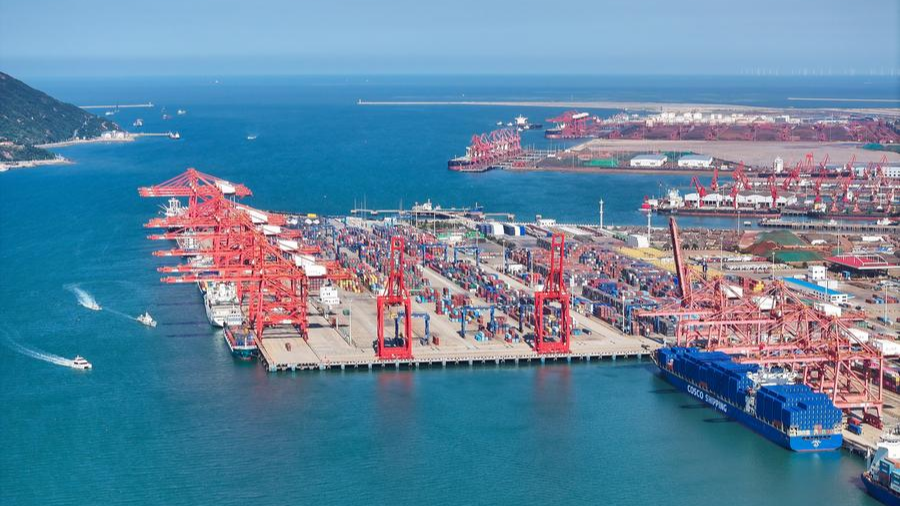Published: September 17,2024

Freight ships docked at the container terminal of Lianyungang Port, east China’s Jiangsu Province, June 26, 2024. /Xinhua
China’s entry into the World Trade Organization (WTO) in 2001 was a pivotal moment in the country’s economic takeoff. This event marked China’s formal integration into the global economic system that ushered in a new era of globalization. The country’s WTO membership sparked a rapid liberalization of international trade, reducing trade barriers. This move has proven to be highly beneficial for both the global and Chinese economies, underscoring China’s increasing influence on the international economic system and inspiring optimism about its future.
The success of Chinese companies can be attributed to two main factors. First, they quickly learned from and then successfully competed with Western companies by absorbing valuable experience and outperforming their competitors through innovation, discovery, and invention. Second, China’s presence in global markets has facilitated the flow of knowledge, technology, and capital into the country, and open markets have played a key role in enhancing competitiveness and fueling China’s long-term export boom.
This global exposure and access to international markets underscores the importance of economic integration and has played a significant role in the emergence of many domestic companies as global leaders in their industries. For example, Huawei, Baidu, and Tencent have excelled in electronics and telecommunications, while Alibaba, BYD, and Contemporary Amperex Technology have made their mark in e-commerce, EVs, and batteries.
Losing their competitiveness, Western countries began to use sanctions and trade restrictions to protect their domestic markets, thus destroying the foundations of the established world economic order. In reaction, Chinese corporations have started building production facilities in friendly jurisdictions such as Ireland, Hungary, Mexico, Singapore, and Vietnam to bypass discriminatory barriers.
This approach has led to numerous successful projects, as only in the last year, investments in such ventures surpassed $18 billion. With that, U.S. and European officials are not just aware but becoming increasingly cautious about potential market loopholes as this trend gains momentum, highlighting the challenges they face.
A recent International Monetary Fund study has revealed a significant trend. While trade and investment between the U.S. and China have declined, the study has highlighted the growing and pivotal role of “connector countries.” These nations, which serve as intermediaries or bridges between China and Western markets, are reshaping the global economic landscape and demonstrating their rising significance.
Why do Chinese investors choose these “connector countries”? For example, Singapore and Vietnam enjoy significant advantages through their bilateral free trade agreements with the U.S. and membership in the Regional Comprehensive Economic Partnership (RCEP). These agreements allow for the export of goods and services from these countries to the U.S. with zero tariffs, making them convenient partners to serve the American market. This strategic insight, a testament to Chinese business acumen, is reshaping the global economic landscape.
Mexico’s participation in the United States-Mexico-Canada Agreement has also opened new opportunities for Chinese investment. This agreement allows free trade of products between the countries, leading to a significant increase in China’s foreign direct investment (FDI) in Mexico. From $500 million between 2000 and 2004, investment has grown to $2.5 billion in 2022. Although this figure is down from its peak of almost $6 billion in 2016, it is still more than double the amount of 2018 and continues to grow.
Similar considerations are relevant for Ireland and Hungary. Both countries are part of the EU, which has a single market for its 27 member states. If products are manufactured and sold within the EU, tariffs imposed by the bloc on products imported from China do not apply.
Ireland’s trade with China has tripled in the last five years, and both sides strongly desire to increase investment. Meanwhile, according to a study by the Berlin-based think tank Mercator Institute for China Studies, Hungary is set to receive 44 percent of all Chinese FDI in Europe in 2023, surpassing investment in Germany, France, and the UK.
The chassis system of a BYD electric vehicle in Budapest, Hungary, October 17, 2023. /Xinhua
Chinese companies increasingly invest directly in the U.S. without “connector countries” involvement. By the end of 2022, nearly 5,000 Chinese companies were operating in the U.S., spanning technology, manufacturing, finance, and real estate. The growth rate of Chinese companies entering the American market has been steady at 8 percent per year over the past five years.
More recently, it has emerged that Chinese solar companies are poised to supply about half of the U.S. market. Within the following year, Chinese companies are expected to be able to produce at least 20 gigawattsof solar panels per year. Local and state officials in places where Chinese firms are setting up factories, including Arizona, North Carolina, Ohio and Texas, have welcomed the investments.
In addition to direct investment into Western jurisdictions, Chinese companies continue successfully raising funding in international capital markets. As of January 8, 2024, there were 265 Chinese companies listed on the major U.S. exchanges, including New York Stock Exchange (NYSE), NASDAQ, and NYSE American, with a combined market capitalization of $848 billion.
With tough competition from high-end Chinese imports offering more value for money and growing concerns about national security, Western countries have started to become cautious about globalization and have eventually taken steps to slow it down. However, numerous examples demonstrate that global trade will persist, and while the pace of globalization may decrease, it cannot be reversed. Innovation and competitiveness will still be crucial in shaping the international order.
About the author: Djoomart Otorbaev, a special commentator on current affairs for CGTN, is a former prime minister of Kyrgyzstan, a professor of the Belt and Road School of Beijing Normal University, a member of Nizami GanjaviInternational Center, and the author of “Central Asia’s Economic Rebirth in the Shadow of the New Great Game.”.
 Africa -China Review Africa -China Cooperation and Transformation
Africa -China Review Africa -China Cooperation and Transformation
